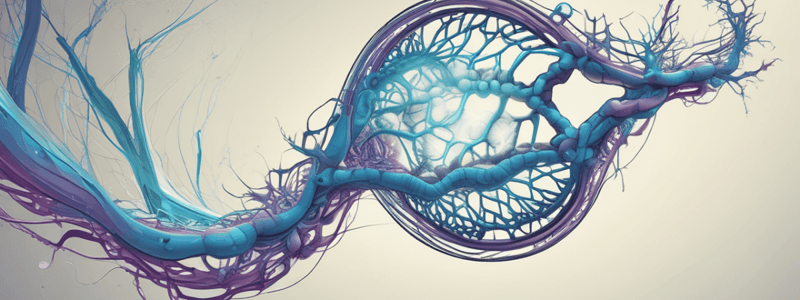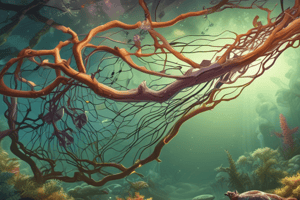Podcast
Questions and Answers
What is the study of the structure and function of biological molecules?
What is the study of the structure and function of biological molecules?
- Zoology
- Molecular Biology (correct)
- Ecology
- Genetics
What is the main function of the cell membrane?
What is the main function of the cell membrane?
- To store genetic information
- To regulate the flow of materials in and out of the cell (correct)
- To generate energy for the cell
- To synthesize proteins
What is the process by which plants convert light energy into chemical energy?
What is the process by which plants convert light energy into chemical energy?
- Homeostasis
- Photosynthesis (correct)
- Cellular Respiration
- Metabolism
What is the study of the relationships between organisms and their environment?
What is the study of the relationships between organisms and their environment?
What is the energy currency of the cell?
What is the energy currency of the cell?
What is the study of the chemical processes that occur within living organisms?
What is the study of the chemical processes that occur within living organisms?
What is the site of protein synthesis?
What is the site of protein synthesis?
What is the study of microorganisms such as bacteria and viruses?
What is the study of microorganisms such as bacteria and viruses?
Flashcards are hidden until you start studying
Study Notes
Definition and Scope
- Biology is the scientific study of life and living organisms
- It encompasses the structure, function, growth, evolution, distribution, and taxonomy of all living things
Branches of Biology
- Botany: study of plants and their interactions with the environment
- Zoology: study of animals and their interactions with the environment
- Microbiology: study of microorganisms such as bacteria and viruses
- Ecology: study of the relationships between organisms and their environment
- Biochemistry: study of the chemical processes that occur within living organisms
- Molecular Biology: study of the structure and function of biological molecules such as DNA and proteins
- Genetics: study of heredity and variation in organisms
- Evolutionary Biology: study of the processes that have shaped the diversity of life on Earth
Biological Molecules
- Carbohydrates: provide energy and structure for cells
- Proteins: perform a wide range of functions including enzymatic, structural, and transport roles
- Lipids: provide energy and structure for cells
- Nucleic Acids: store and transmit genetic information
- ATP: energy currency of the cell
Cell Structure and Function
- Cell Membrane: semi-permeable membrane that regulates the flow of materials in and out of the cell
- Cytoplasm: gel-like substance inside the cell membrane where metabolic processes occur
- Nucleus: contains the cell's genetic material
- Mitochondria: generate energy for the cell through cellular respiration
- Ribosomes: site of protein synthesis
- Lysosomes: contain digestive enzymes that break down and recycle cellular waste
Biological Processes
- Photosynthesis: process by which plants convert light energy into chemical energy
- Cellular Respiration: process by which cells generate energy from glucose
- Metabolism: set of chemical reactions that occur within cells to maintain life
- Homeostasis: ability of an organism to maintain a stable internal environment despite changes in the external environment
- Transportation: movement of materials in and out of cells and throughout the body
Definition and Scope of Biology
- Biology is the scientific study of life and living organisms, encompassing their structure, function, growth, evolution, distribution, and taxonomy.
Branches of Biology
- Botany: the study of plants and their interactions with the environment.
- Zoology: the study of animals and their interactions with the environment.
- Microbiology: the study of microorganisms such as bacteria and viruses.
- Ecology: the study of relationships between organisms and their environment.
- Biochemistry: the study of chemical processes that occur within living organisms.
- Molecular Biology: the study of biological molecules such as DNA and proteins.
- Genetics: the study of heredity and variation in organisms.
- Evolutionary Biology: the study of processes that have shaped the diversity of life on Earth.
Biological Molecules
- Carbohydrates: provide energy and structure for cells.
- Proteins: perform enzymatic, structural, and transport roles.
- Lipids: provide energy and structure for cells.
- Nucleic Acids: store and transmit genetic information.
- ATP: the energy currency of the cell.
Cell Structure and Function
- Cell Membrane: semi-permeable membrane regulating the flow of materials in and out of the cell.
- Cytoplasm: gel-like substance inside the cell membrane where metabolic processes occur.
- Nucleus: contains the cell's genetic material.
- Mitochondria: generate energy for the cell through cellular respiration.
- Ribosomes: site of protein synthesis.
- Lysosomes: contain digestive enzymes that break down and recycle cellular waste.
Biological Processes
- Photosynthesis: the process by which plants convert light energy into chemical energy.
- Cellular Respiration: the process by which cells generate energy from glucose.
- Metabolism: a set of chemical reactions that occur within cells to maintain life.
- Homeostasis: the ability of an organism to maintain a stable internal environment despite changes in the external environment.
- Transportation: the movement of materials in and out of cells and throughout the body.
Studying That Suits You
Use AI to generate personalized quizzes and flashcards to suit your learning preferences.




